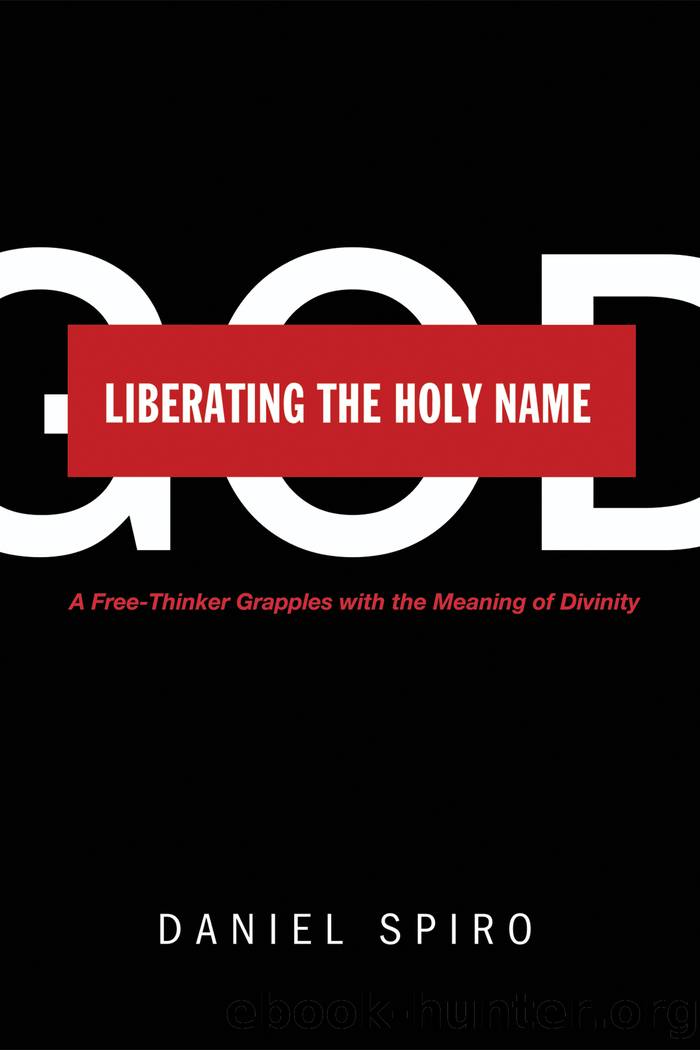Liberating the Holy Name by Spiro Daniel;

Author:Spiro, Daniel; [Spiro, Daniel]
Language: eng
Format: epub
ISBN: 9781630872380
Publisher: Wipf and Stock Publishers
Published: 2014-07-09T00:00:00+00:00
91. Tillich, Systematic Theology, 228.
92. Ibid., 235â36.
93. Ibid., 155.
94. Ibid., 241.
95. Ibid., 156.
96. Spinoza, âEthics,â Part V, Prop. 19, 372.
97. Spinoza, âEthics,â Part V, Prop. 42, Scholium, 382.
Part II
God in the Second Person
So, do you view God primarily as something to be studied and conceptualized or someone to be encountered and addressed? The chic answer, in theological circles, is the latter. To say that âGod is beyond conceptualizationâ has become the theological equivalent of â2+2=4.â According to conventional wisdom, those of us who can adroitly discuss the meaning of the word âGodâ are nothing more than homo intellecticus and are missing the whole point of the Divine. Conceptualizers are said to be brains without souls, pedants with tunnel vision, and novices in the realm of the spirit. By contrast, those who can pray with all their hearts, deeply meditate on the mantra âOne,â or approach every earthly meeting as a divine encounter are extolled not only for their spirituality but also for their wisdom.
I canât tell you how many times Iâve seen that theme in print. And I still donât fully buy into it. Obviously, we can never completely capture God in conceptual form. But does that mean we need not try? When even many of our brightest theologians and clergy donât attempt to conceptualize God in a logically coherent way, we as individuals tend to be left to our own devices . . . or to the preaching of charlatans. And if that means that large segments of society become apathetic or dismissive about the whole domain of religion, whereas other segments look to Godâs supernatural intervention to solve our greatest problems, we all must live with the consequences.
If we are to communicate with one another about divinity, it is invaluable that you understand who or what I mean by the word âGod.â That is why we began this book by considering God in the third person. But it was never my plan to limit ourselves to that third person framework. In fact, we couldnât pull that off even if we wanted to. In the Spinozistic words of Jay Michaelson, âthe heart loves what the mind knows.â98 In other words, the more we learn about the Divineâthe more coherent, subtle, and reasonable our conception of God becomesâthe more we come to love God. And it is impossible truly to love something, or someone, and not desire a meaningful encounter with this beloved. I feel that way about the birds that nest on my back porch just as I do about The Ultimate Synthesis.
In this part of the book, I will attempt such an encounter with the Divine. Every statement will be made directly to God and God alone.
In connection with these statements, at least three fundamental questions arise. First, by speaking to God, am I expecting to receive a response? Second, if indeed the answer to that first question is yes, from whom do I expect that response? From God? Or only from myself? And third, whenever I use
Download
This site does not store any files on its server. We only index and link to content provided by other sites. Please contact the content providers to delete copyright contents if any and email us, we'll remove relevant links or contents immediately.
| Baha'i | Cults |
| Demonology & Satanism | Eckankar |
| Egyptian Book of the Dead | Freemasonry |
| Messianic Judaism | Mysticism |
| Scientology | Theism |
| Tribal & Ethnic | Unitarian Universalism |
The Four Agreements by Don Miguel Ruiz(6322)
Breaking Free by Rachel Jeffs(4013)
The Hatha Yoga Pradipika (Translated) by Svatmarama(3077)
120 Days of Sodom by Marquis de Sade(2943)
Member of the Family by Dianne Lake(2262)
The Tao of Physics by Fritjof Capra(2168)
The Psychedelic Gospels: The Secret History of Hallucinogens in Christianity by Jerry B. Brown(2073)
The Road to Jonestown by Jeff Guinn(1983)
Going Clear: Scientology, Hollywood, and the Prison of Belief by Lawrence Wright(1884)
Going Clear by Lawrence Wright(1873)
Uriel's Machine by Christopher Knight(1823)
The Grand Grimoire: The Red Dragon by Author Unknown(1711)
The Gnostic Gospel of St. Thomas by Tau Malachi(1680)
Key to the Sacred Pattern: The Untold Story of Rennes-le-Chateau by Henry Lincoln(1556)
The Malloreon: Book 02 - King of the Murgos by David Eddings(1518)
Waco by David Thibodeau & Leon Whiteson & Aviva Layton(1488)
The New World Order Book by Nick Redfern(1485)
The Secret of the Temple by John Michael Greer(1422)
The Initiatory Path in Fairy Tales by Bernard Roger(1395)
